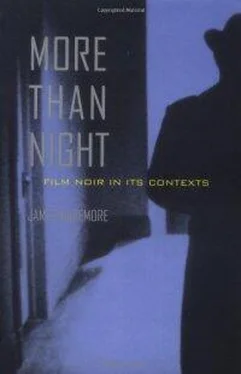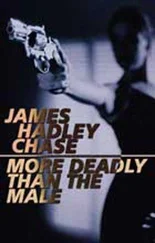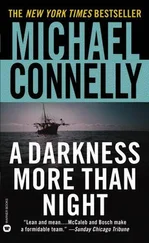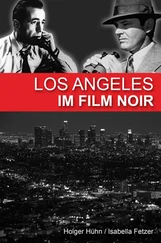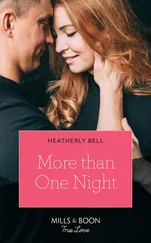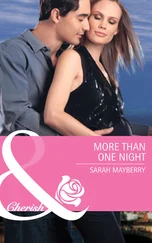Gittes is a hothead and vulgarian; he overdresses, he horselaughs at dirty jokes (which he thinks his secretary shouldn't hear), and he can't talk to a rich lady client without accidentally falling into profanity. Even so, he uneasily insists that his small business is an "honest living," and in a barber shop he almost starts a fight with a banker who sneers at him. He also tells a couple of self-righteous cops that he would never stoop to extortion. During the course of the film, he emerges as a slightly more believable version of a fantasy Bogart sometimes embodiedthe tough man whose exterior disguises compassion and an outraged sense of justice. From indirect references in the dialogue, we learn that he was once a policeman in Chinatown, where his job was "puttin' Chinamen in jail for spittin' in the laundry." His orders were to do "as little as possible" because, as the district attorney once said, "you may think you know what's going on, but you don't.'' Gittes complains, "You could never figure out what was happening." Something tragic happened in Chinatownthe movie never tells us what, but it concerned a woman Gittes was trying to help. Now, during the course of his present investigation, his history repeats itself with a vengeance. He becomes involved with the wealthy and enigmatic Evelyn Mulwray (Faye Dunaway) and tries to help her out of trouble. Events begin to take on affinities with those in Vertigo (1958): the upper-class woman in the present becomes an echo of a woman in the past, and after the detective has peeped into other people's lives and found the keys to a murder and a political scandal, he is crushed under the very guilt he was trying to overcome. But the solution to the mystery also has profound social consequences. By the end, the Chinese ghetto has become the symbol of an epic corruption and irrationalitya disease that spreads as wide as the city and is about to spread into the surrounding valley.
The crimes depicted in Chinatown include not only murder and political chicanery, but also incest and pedophilia between the almost mythical tycoon Noah Cross (Huston, a myth himself, who had recently played Noah in The Bible) and his daughter Evelyn. Even so, the movie would probably be less disturbing if Polanski had not subtly linked its dark sexual themes to the psychology of Gittes. In an interview at the American Film Institute, Polanski revealed that he had greatly heightened the subjectivity of the narrativein fact, he shot nearly everything from Gittes's point of view, showing him peering through camera lenses or windows and constantly spying on the other characters. Largely because of this device, Chinatown becomes a study in the sadistic gaze, and it ends when Gittes finds himself an unwitting accomplice in the death of the woman he is spying uponindeed, he is handcuffed to the man who fires the gun.
The theme of universal guilt and sexual malaise is typical of classic noir, but Chinatown benefits from the relaxation of censorship codes, and despite its underlying emphasis on voyeurism, its treatment of Evelyn Mulwray is relatively unusual. Given the deep ambivalence toward women in movies such as The Maltese Falcon, Out of the Past, and The Lady from Shanghai, we expect her to be a vessel of evil sex; in fact, she turns out to be a victim. Chinatown is also unusual in its forthright treatment of greedy capitalists and crooked politicians. Towne based his script on an actual scandal that hit Los Angeles in the early decades of the century, when rich men bought cheap farmland and had it incorporated into the city, thus acquiring control over the area's water supply. As Mike Davis observes, "The windfall profits of these operations welded the ruling class together and capitalized lineages of power (notably, the Times-Mirror empire) that remain in place today" (114). In the last analysis, therefore, 1930s L.A. becomes a metaphor for the whole of Richard Nixon's America.
Meanwhile, Polanski's European sophistication comes through, giving the movie a decadent, voluptuous pace and a subterranean horror. The violence of the film is understated and largely repressed, but occasionally it surfaces, especially when Polanski himself appears, playing Elisha Cook Jr. to Nicholson's Bogart. Nicholson calls Polanski a "midget," whereupon the little man administers a symbolically appropriate retaliation; inserting a switchblade into the private eye's left nostril, he neatly slices the wing of the nose. Polanski is probably also responsible for making the world of the film resemble the fiction of Nathanael West. The slick-haired men and heavily made-up women are attractive, but the nostalgic effects sometimes have a disquieting effect. Even Faye Dunaway, who remains passionate and sexy, is not quite the glamorous figure we associate with this kind of movie. Her face is powdered, her eyes are red, and her teeth are stained from lipstick. Her hair, which she compulsively brushes back from her forehead, is stiffened with permanent waves. She is frequently dressed to the neck in gray or black, but in one scene she wears riding clothes and her throat is sweaty. Her every gesture suggests frustrated sexuality and incipient madness, and Polanski, who was always more interested in the pathology of sex than in romance, seems to have encouraged her nervousness by keeping the camera close to her face. 37Again and again, he juxtaposes her suffering with that of a spotlessly innocent-looking girl (Diane Ladd) whom she is trying to hide from Gittes. The image is diabolically clever, because the girl's innocence turns out to have been born out of the corruption that threatens to destroy her.
Much of Chinatown has a quiet, ghostly feel, as when Gittes stands outside the Mulwray estate and hears the faint squeak of chamois against a yellow Packard. The movie is also filled with Asian servants and Latino workers who glide around the edges of the scenery, watching the white world decay. The houses and settings are nicely selected and designed to evoke the period, and yet they seem vaguely embalmed, in part because of John Alonzo's anamorphic, often extremely low-key photography, which hides interiors in gloom and emphasizes dry, yellowish colors. The air of grotesquerie extends even to minute details that register almost subliminally: vaguely funereal flowers in vases or on lawns; a picture of a black sailing ship on a wall behind two doomed women; a pattern on a bedspread that I momentarily took for a bloodstain; and a girl's summer dress and wide straw hat lying incongruously in a dark living room. In one shot late in the movie, Gittes bends over to look at a shiny object at the bottom of a pond. Off in the corner of the screen, something stirsthe reddish fin of a goldfish, looking for an instant like a monster. (Earlier, we recall, Polanski promised to feed the hero's nose to a goldfish.)
This sinister ambiance prepares us for the climactic moments, when Gittes finds himself back in Chinatown. Here again the film invites comparison with The Maltese Falcon and other dark thrillers of the 1940s, many of which came to ironic, somewhat joyless conclusions, based on a deep-seated sexual paranoia. The note of failure in classic noir, however, was frequently softened by a qualified attempt to assert some kind of justice or return to social equilibrium. In contrast, Chinatown is truly pessimistic. Because it is a Vietnam-era film, contemporary with the Watergate scandals, its hero does not walk away from chaos like Welles in The Lady from Shanghai ("Maybe I'll live so long that I'll forget hermaybe I'll die trying"); instead, he is helped offscreen by two of his business partners. The ordinary institutions having failed, he remains locked in a world of irrational greed and sickness, and his consciousness of that world has left him so numb he can barely move.
Читать дальше
